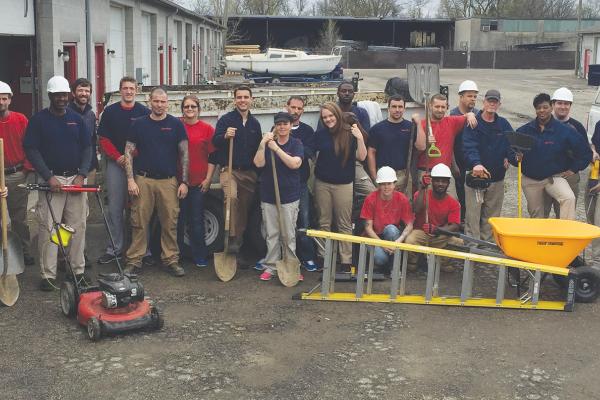THE FIRST TIME I saw John Rush was during a 2015 political forum at a local high school in Columbus, Ohio. Rush was running for city council, and though all the candidates had been invited, many didn’t bother to show up. As Rush began his presentation, he brought empty chairs up on the stage and made some quip about how the chairs were waiting for the absent candidates. The joke was not cryptic or unkind; it drew gentle laughter and applause from the audience. I didn’t know what party Rush belonged to, but I was captivated.
As a longtime pastor in Columbus, I’d seen a lot of candidates for city council. All of them had the usual rash of promises: They would create jobs; they cared about “the least of these”; they listened to the hearts of the people. Voting for them would help change the world.
But Rush seemed different. Though he was a white man with a military-style buzzcut speaking to a room full of African Americans, he didn’t seem shy or uncomfortable. He didn’t make a lot of promises. He just talked about how he knew what people were going through, and his knowledge seemed genuine, like he had “been there.” He mentioned growing up really poor, in Appalachia, and how that felt. He joked about being an evangelical who cared about more than the wedge issues of abortion and same-sex marriage. He talked about knowing how to listen to and appreciate all kinds of people. Nobody, it seemed, was an outsider to him.
Rush eventually lost his bid for election, but the more I learned about him, the more fascinated I became. He spent his early years in a trailer park surrounded by racism, joined the Marines, and later returned to the Midwest to help found a nondenominational church in Chicago. He now runs a business that helps people who were incarcerated or caught in human trafficking reintegrate into society. He was an ordinary person, leading an extraordinary life.
And his commitment seemed rare. Many church people are willing to give money for various causes, but far fewer Christians want to be in the midst of people who are hurting—touching them, feeding them, talking to them, and seeing them as human beings with needs and untapped capabilities. Rush was saying his faith called him to people, not compelling him to remain comfortable.
A “huge disconnect”
“It was a pretty impoverished neighborhood,” says Rush of the West Virginia trailer park where he grew up with his father. “We had a mattress, two cardboard boxes, and a couple of toy trucks.” In that trailer park, white people were pretty glad they were white, and they weren’t afraid to admit it; the Confederate flag was part of the landscape. At the same time, there were people there who didn’t seem to care at all about race but just tried to survive crippling poverty.
Despite their poverty, Rush and his dad had a rich life together. “I didn’t know we were poor because my dad took a lot of time with me, and we played a lot,” says Rush. The pair eventually moved to Charleston, W.Va.—like “moving to New York City,” remembers Rush—where Rush’s world began to expand. Though the West Virginia trailer park had been mostly white, in Charleston he went to an integrated school. He “met a lot of other folks who looked different,” including Albert, his first black friend. Through his friendship with Albert, Rush became aware that there was a stark difference between the way black and white people lived, even in poverty.
And though they lived in poverty, his parents reminded him that God called them to help others. Rush credits his stepmother for teaching him, mostly by example, about service. “It exposed me to the needs of people in the community and also to the fragility of life,” says Rush. One day, while volunteering at a nursing home as an adolescent, Rush noticed that the old people were too often sitting alone. “I remember thinking that one day I’m going to be sitting in one of these places, and I want to live a life of purpose,” he explains.
When Rush was 13, he went to Cleveland to live with his biological mother, a recovering drug addict who had left him and his father when Rush was a toddler. In Cleveland, Rush began attending a fundamentalist Baptist church, where his curiosity about Christianity began in earnest. He loved studying the requirements of his faith. During high school he encouraged the student body to think about how they could reach out to the homeless community. “I didn’t know what that meant, really. I still don’t,” admits Rush, chuckling slightly, “but I knew it was something we needed to be concerned about.”
But it wasn’t until later in life—after his tour of duty as a Marine, when Rush had returned to the Midwest—that Rush began to think about how the inequity he saw as a child, the life of service modeled by his stepmother, and his faith might all work together. At the time, Rush was mentoring men who formerly had been homeless on Chicago’s West Side and sharing with them the importance of a relationship with God. But as Rush described it, he realized there was a “huge disconnect between the idea of the world to come and everyday life.”
“I realized that part of the Christian faith is the integration into everyday life, and I had to ask, ‘What does that mean for me, personally?’” Rush explains. “It’s more than talking about Christian ideas; it’s about policy, community development, substance abuse, human trafficking, racial discrimination, poverty.”
Money vs. love of money
By the time Rush had this realization—that a living faith meant his business should attend to the needs of people—he had acquired five master’s degrees in everything from theology to business management. In 2011 he and others started a conversation with philanthropic investors who wanted to launch a social enterprise. According to Rush, a social enterprise is an entity structured to maximize its bottom line in a way that maximizes its mission outcomes. Typically, an enterprise like this is “a service-based business,” he explains, “designed to create training, employment, and career opportunities for men and women who have significant barriers to employment.”
Rush and some investors began to figure out how they could meld this vision of business and faith. They began seeking funds from venture capitalists and others to launch CleanTurn Enterprises in 2012. CTE’s focus was to incubate business lines, including a demolition service and a cleaning company, that would provide jobs and job training for people who had significant challenges in their pasts, such as incarceration, drug addiction, alcoholism, and intergenerational poverty. Rush felt that these people were being punished for their weaknesses, and he wanted to do something to help them turn their lives around.
And he did: In the past five years, CTE has hired more than 400 people who have learned specific job skills plus the relational abilities necessary to get a job and keep it: conflict management, discipline, and how to balance the demands of employment. Though CTE is a for-profit business, Rush says making money is not the driver. “It’s not money that is the root of all evil, it’s the love of money,” says Rush, correcting the often-misquoted passage of scripture. “Good business principles can be a way to impact society in a positive and more sustainable way. It requires constant, vigilant introspection and examination of one’s heart to make sure the heart is in the right place.”
The profits CleanTurn earns help pay for the mentoring and coaching it provides to its staff. “Our fundamental purpose in maximizing profit ... is to maximize our capacity to invest in our staff and their professional and personal development,” says Rush. “We have an ambitious plan for how we want to leverage our profit to feed growth and invest it in the development of our team members.”
But developing the staff, many of whom have not been successful in the workplace, can be difficult. “We demand excellence,” says Rush. “If they are tardy, we have to teach them that being late to work is not acceptable. If the behavior continues, we sometimes have to let them go. That hurts because we want them to be successful, but there are things every individual has to do in order to make it in the workplace. There are no exceptions. We do them no favors if we just let them slide when they need to be called on what they do or do not do.”
Beauty, business
As Rush sees it, all of his responsibilities and relationships are governed by the same ethical principle. “With Dostoyevsky, I do believe beauty will save the world,” says Rush. “I long to be captivated every day by what I understand to be a love that is, in the end, indescribable but radically transforming.”
As a business owner, Rush believes saving the world with beauty means using his skills as an entrepreneur to help “the least of these” get on their feet and stay there. According to Rush, he gets glimpses of this beauty from reading scripture, especially the psalms and the gospels. Yet he also admits that beauty often shows up in less-likely places.
“It breaks through in the most unpredictable scenes of life,” says Rush. “Walking down an alley and past a vacant and abandoned house, there are sounds of laughter, tears, and memories that I do not know if in fact existed, but my imagination paints the scene. I feel the hopes, the dreams, the frustrations, the longings of family.”
“I do not have the capacity to know what the ‘best’ business model might be, though I will continue to read, study, and learn what I can,” he says. “But as one small voice in this grand conversation, I have one ultimate longing, a longing for all things to be made right—for beauty to save the world. Until such time, in whatever degree I can, I want to reflect such beauty in everything I am engaged in.”

Got something to say about what you're reading? We value your feedback!

